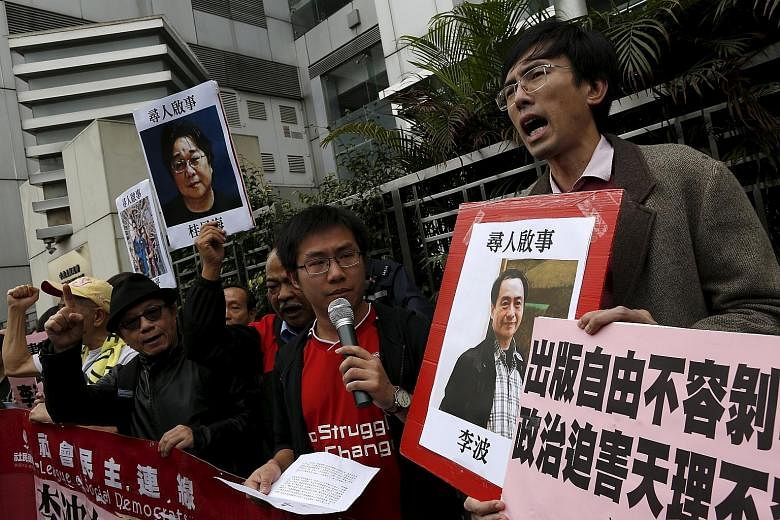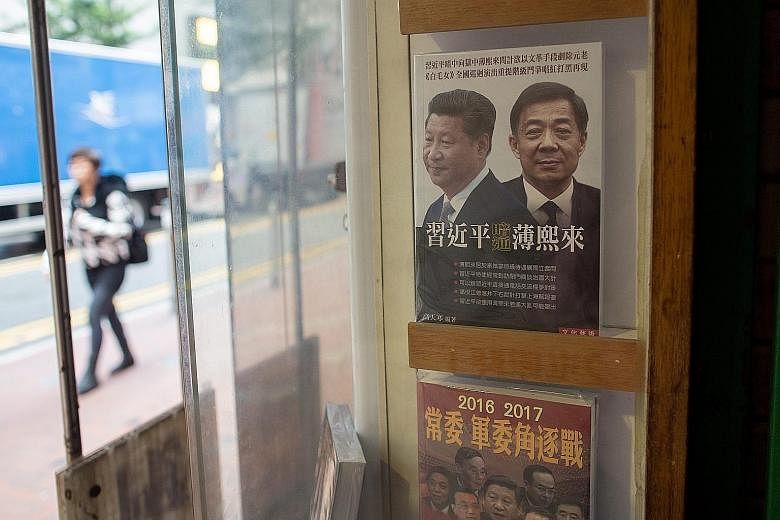In the past week, Hong Kong witnessed the peculiar sight of having its chief executive and a student activist stand virtually shoulder to shoulder on an issue.
Last Monday, Mr Leung Chun Ying, routinely derided by his critics as a Beijing stooge, took a robust stance on the possibility that mainland Chinese security agents might have arrested a Hong Konger on Hong Kong soil.
This would be "unacceptable" and unconstitutional as it violates the "one country, two systems" framework and the Basic Law, the city's leader said in a hastily called press briefing, while saying there has been no indication that it was true.
Two days before, Ms Agnes Chow, 19, who was the spokesman for the pro-democracy student group Scholarism during the Occupy movement in 2014, made a similar point in an impassioned video uploaded on Facebook.
If the speculation of mainland agents nabbing a Hong Konger here is true, it indicates the erosion of the "one country, two systems" principle.
"We feel that Hong Kong is not Hong Kong any more; it is named as Hong Kong only," she said.
That Mr Leung and Ms Chow have become strange bedfellows highlights the extent to which the case of the missing booksellers of Hong Kong has perturbed the city and the world.
Nearly two weeks ago, two days before the new year, Mr Lee Bo, 65, a partner of Hong Kong publishing firm Mighty Current, which publishes and sells gossipy political titles about China's leaders, disappeared after going to his warehouse in Chai Wan.
While his official travel documents remained at home, he later called his wife from a Shenzhen number saying that he was helping in an investigation, raising suspicions that he had been nabbed by mainland officers.
Four of Mr Lee's colleagues had vanished in similar fashion, last October; one in Thailand and the rest in mainland China.
Later, in a handwritten note which some believe to have been written under duress, Mr Lee said he had made his way to the mainland on his own to handle an urgent matter.
The strange tale soon attracted international attention, especially when it was revealed that Mr Lee is a British citizen.
Hong Kong's former colonial master called for answers. British Foreign Secretary Philip Hammond, by happenstance visiting Beijing last week, said any abduction of people from Hong Kong to face charges elsewhere would be an "egregious breach" of the 1984 Sino-British Joint Declaration inked ahead of the 1997 handing over of Hong Kong to China.
"It's an essential part of the settlement in Hong Kong that it has its own judicial system and it is solely responsible for trying offences that occur in Hong Kong," said Mr Hammond.
The United States and the European Union also chimed in, with a US State Department spokesman saying that the superpower is "disturbed". Taiwan - for which the "one country, two systems" model was originally conceptualised as a means to achieve unification - stepped in too, with presidential candidates Tsai Ing-wen and Eric Chu urging clarity.
Hong Kong Security Secretary Lai Tung Kwok said the city was still awaiting a response from the mainland authorities on the fate of the men, and would ask again "if necessary".
Unsurprisingly, Beijing took umbrage at what it termed as interference in China's domestic affairs, adding that Mr Lee is "first and foremost a Chinese citizen".
In what many saw as further tacit admission that mainland agents had indeed kidnapped the quintet, the Communist Party-linked Global Times said on Wednesday "powerful agencies" around the world have their ways to circumvent the laws when seeking any individual for investigation.
It asserted in an editorial that it is lawful and logical for mainland agencies to call the booksellers in for investigation, as the booksellers had created "special disturbances" affecting order on the mainland.
A source close to the mainland authorities said the books irked the leaders because they were not just being bought by individual Chinese tourists but were also being smuggled via ferries into the mainland to be peddled on the black market.
Such shenanigans had been ongoing for a while, but "new material would have compromised national security", and so it was "time to take action", he said.
China specialist Willy Lam said it is believed the offending title was an impending tell-all book called Xi Jinping's Lovers, about the Chinese President's supposed extra-marital affairs, but the source said it could have been "more serious material".
All the sound and fury about the "one country, two systems" framework being transgressed, meanwhile, was just that, he argued.
For one thing, it is possible that Mr Lee was not kidnapped on Hong Kong soil, but was lured onto a boat, before being arrested in mainland waters, making it technically legal.
Anyway, he added, foreign espionage agencies such as the United States' CIA, Israel's Mossad, and the former Soviet Union's KGB, have engaged in extra-judicial practices.
In fact, within Hong Kong, there is precedent.
Retired Straits Times senior writer Ching Cheong, who had previously written for pro-Beijing paper Wen Wei Po, wrote in an article for news website Initium Media that he had heard of previous cases of mainland agents attempting to assert their authority in Hong Kong.
In 1995, Hong Kong businessman Su Zhiyi and his wife Gan Shuyi were detained in mainland China over a business dispute. During this period, Mr Su was thrice escorted back to Hong Kong to collect evidence. Their daughter Su Xue reported the case to the police, and even named the public security officers involved.
"As the timing was close to the reunification, Beijing was worried the incident will affect the reunification process, hence it instructed the public security bureau to relay orders to all provincial bureaus: approval must be granted before taking enforcement action in Hong Kong," the writer said.
It did not seem to have deterred further attempts: In 2004, seven individuals from the mainland came to Hong Kong in an attempt to "control" Minfa Securities boss Wu Yonghong who had been accused of fraud. But Mr Wu called the Hong Kong police who subsequently arrested the seven. Two were later confirmed to be mainland public security officers.
How the curious case of Hong Kong's missing bookseller will conclude remains to be seen.
For now, the pro-establishment coalition is struggling to explain the saga and maintain its credibility.
Legislator Ng Leung Sing drew ridicule when he suggested in the Legislative Council that Mr Lee could have visited prostitutes with his four associates on the mainland and was arrested by the police there.
With their warnings about the "evils" of communist rule seemingly vindicated, the pro-democracy camp is meanwhile gaining the moral high ground.
The Hong Kong Alliance in Support of Patriotic Democratic Movements of China will stage a protest today, saying it is a critical moment for Hong Kong to defend human rights and the "one country, two systems" principle.
Mr Leung will not join in. But as the controversy rages on, he will have to ponder a face-saving way out for both his bosses in the Zhongnanhai compound in Beijing and the public in Hong Kong.


